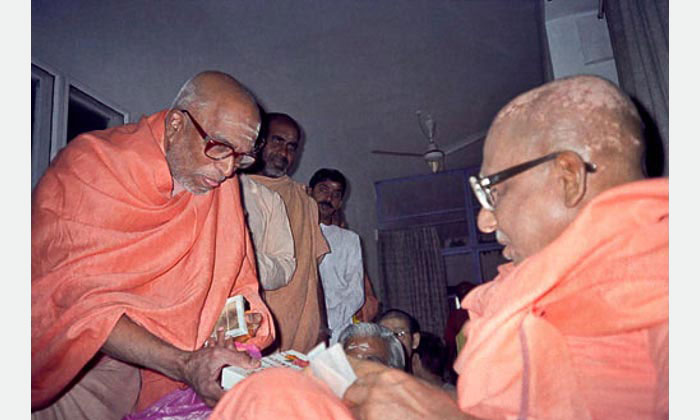Commentary on the Isavasya Upanishad : 18. Swami Krishnananda.
=========================================================================
=======================================================================
Sunday, November 06, 2022. 06:30.
Part-3.
Post -18.
========================================================================
The effect of this kind of involvement in physical activity and bodily comfort is one thing. That is unadulterated bondage, as can be very well imagined by everyone. We will be born into the same condition in which we lived because of such attachment to the physical body and the actions of the body in relation to the physical world. There is no Atman, no God, no spirituality; no such idea occurs to the minds of people who are totally physical, material, economic, bound to human society, family, money, name, fame and power. All these come under worldly comforts, connected with human activity of various kinds. There is no talk of Atman, Self, Light, etc. To darkness they go, because of the sheer ignorance in which they are living.
Now, what is the step that we have to take to free ourselves from this possibility of entering into darkness? If we ignore the world, ignore the body, and contemplate the Atman, to greater darkness we go. This is how the Upanishad tries to catch us from both sides. We will not be permitted to be wholly interested in the bodily requirements and the world of activity, because we will be condemned to go to darkness. Killers of the Self are those who think only of the body and all its relations in the form of activity in the physical world, says the Upanishad. But what about those who have awakened to this consciousness of the bondage of this body and the world, and abstain from all work, ignore the body, punish it, and do tapas to such an extent that it starves and kills the body for the sake of the Atman? To greater darkness they go. It is worse than the darkness into which others enter.
The nature of Ultimate Reality is neither externality not internality. God is not outside. God is also not inside. There are people who have no idea of the Selfhood of the Supreme Being, which dominates all life as the Atman Supreme, and consider themselves satisfied with world relations. There are others who think that God is not connected with the world. He is extra-cosmic. There is absolutely no relation between God and world, because God is uncontaminated by space, time and objectivity. This is what we hear in the scriptures. There is neither space nor time, nor individual objects in God. And this world is nothing but that. It is just space, time and objectivity. How can there be any connection between darkness and light? This world is like darkness, and it is perpetually changing. God is unchanging. Everyone in this world is grief-stricken; everyone has some sorrow or the other. God is free from all grief and sorrow; He is all bliss. This is the world of death, where everyone has to die one day or the other. God is immortal. What connection can there be between this world and God, if this is the state of affairs? Therefore, it is futile to have any kind of relation with this world. We shall retire from all relationship to the body and the world, and contemplate that which is not of this world, not in this world and which has no connection with this world.
This is a mistake, says the Upanishad. It is a mistake to think that this world is everything, that bodily comfort is all-in-all, and to live and die only for work. It is a mistake not to have any cognisance of a reality that is above the world. But it is also a mistake to imagine that reality is totally outside the world and has no connection with this body, the prana, the senses, the mind, and any kind of relation in this world. Mostly religious practices go to extremes of this type or that type. Transcendence is mostly the attitude of religion. We have to blend avidya and vidya together for the sake of freedom and immortality, says the Upanishad. The bondage to which we are subjected by action, day in and day out, will make us disgusted with everything, and we will be automatically freed from the impulse to act. The world itself will liberate us from its clutches when we have paid our debts to it.
We owe a debt to this world, and we owe a debt to this body. It is the debt that we owe to this body and the world that compels us to live in this body and to work in this world. Sometimes this debt is designated as prarabdha karma – a kind of nemesis, a reaction produced by certain actions that we did in the past, accumulated for the purpose of experience in this world, forcing us to reap the fruit of those actions, whether pleasurable or miserable, whatever the case may be. This is that impulse to act. It is this impulse that keeps us alive in this body. As long as the reaction of those actions, called prarabdha, continues, as long as the momentum of those actions continues, as long as we have not exhausted by experience the results of those actions which are called prarabdha, the body will continue to live. The body cannot live even for a moment after the exhaustion of this prarabdha karma. Like the flame of a lamp gets extinguished when there is no more oil, death of the body will take place instantaneously when the momentum of those actions which have produced this body ceases to act. Similarly will the impulse to act in this world cease automatically.
*****
To be continued
=========================================================================










Comments
Post a Comment